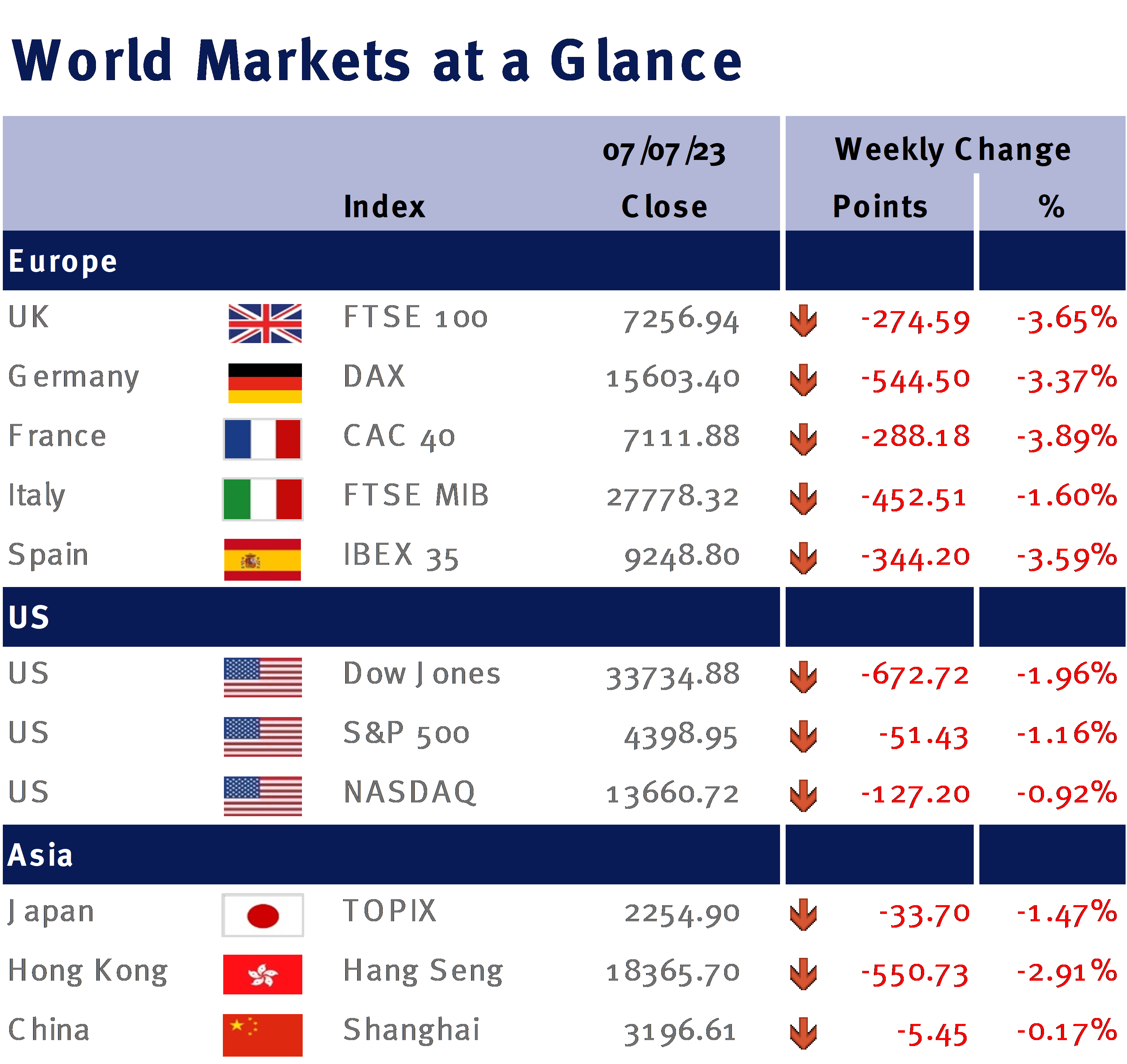This week, US employment data was mixed. Although unemployment was down, the economy added 209,000 new jobs, and this is lower than the 240,000 expected by economists and below that of 309,000 added in May. Though hiring seems to be cooling, the latest figures indicate that the labour market remains tight, despite the Fed executing 10 consecutive rate hikes since March 2022 (when it undertook its speediest efforts to tighten policy in 40 years). While the influx of new hires is helping the economy to quieten predictions of a recession, US employers have now added jobs for 30 consecutive months and, with the unemployment rate down to a low of 3.6%, many are anticipating that the Fed may go ahead and add another interest rate raise next month to aid in further tempering inflation. On Wednesday, we also saw markets receive Fed minutes as hawkish and assume a further rate hike cycle. This is not necessarily the case, as the Fed remains data dependent.
Week ending 7th July 2023.
10th July 2023

Another consideration for the Fed in their next confab on inflation will also surely be the US’ current situation with wage growth. Average hourly earnings increased by 4.4% in June – a continuation of the same margin in May. This is ultimately positive news for corporations for their ability to expand and grow. It is also joined by data this week showing that US Factory Orders have risen by 0.3%, matching April, and yet, with inflation continuing to remain at double the Fed’s 2% target, the more money there is in consumers’ pockets to spend, the more eyes will be on the Fed’s meeting on the 25th and 26th of this month for ways to bring inflation back into line.
Over in the Eurozone, economic giant Germany saw factory orders rebound significantly in May, although overall orders are still down 4.3% from a year earlier, and orders are being offset by demand for services. The figures come as positive news in a period where German businesses are showing signs of rocky growth, however notable concerns for the bloc do still remain around energy prices.
Chinese PMI data released last week initially disheartened markets as factory expansion lost some momentum in June. While markets sold off on the perceived contraction – as PMI figures came in below expectations at 53.9 – it still marked the 6th straight month of expansion (as any figure above 50 represents growth, even if at a slower pace in this case) which is a further boon for the reopening Chinese economy.
Finally, on Thursday this week, US Treasury Secretary, Janet Yellen, travelled to Beijing bent on improving communications and repairing the tenuous relationship between China and the US. Reports noted that each side had a sizable list of issues to raise with the other, and not much ability to adapt or develop their policies, but Yellen’s visit laid the groundwork for future collaboration. Amongst those topics on the table were the US’ perception of China’s ‘unfair economic practices’, and Yellen’s imploration to construct trade relations that do not force other countries to take sides with either the US or China.
Still to come this week we have US CPI data, UK GDP and Unemployment rates, Japan Industrial Production data and Irish inflation.
Nicola Tune, Portfolio Specialist
The latest market updates are brought to you by Investment Managers & Analysts at Wealth at Work Limited which is a member of the Wealth at Work group of companies.
Links to websites external to those of Wealth at Work Limited (also referred to here as 'we', 'us', 'our' 'ours') will usually contain some content that is not written by us and over which we have no authority and which we do not endorse. Any hyperlinks or references to third party websites are provided for your convenience only. Therefore please be aware that we do not accept responsibility for the content of any third party site(s) except content that is specifically attributed to us or our employees and where we are the authors of such content. Further, we accept no responsibility for any malicious codes (or their consequences) of external sites. Nor do we endorse any organisation or publication to which we link and make no representations about them.

